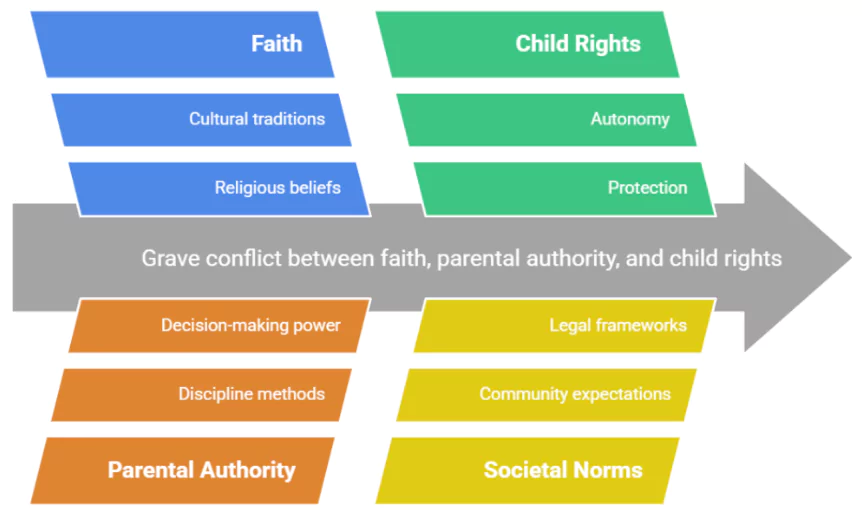A three-year-old girl suffering from a terminal brain tumour, died after being initiated into Santhara, a religious Jain ritual of voluntary fasting unto death.
- Glorifying the event: The issue drew national attention after the Golden Book of World Records recognized the child as the “youngest person in the world to vow the Jain ritual Santhara,” sparking outrage among medical professionals, child rights activists, and legal experts.
- The move was labelled irresponsible and unethical, as it appears to endorse a practice involving non-consensual participation of a minor.
- Investigation: The Madhya Pradesh Child Rights Commission has taken cognizance of the matter.
- Officials have confirmed that they are examining if this act constitutes a violation of child protection laws, and are considering legal action against the parents and the spiritual leader involved.
Ethical Dilemmas Raised by the Case
Parental Consent vs Child Autonomy
- While parents are legal guardians, the ethical boundary of their decision-making is questioned when the action leads to irreversible harm or death.
- In this case, a toddler could not have understood or consented to a life-ending religious ritual.
- Therefore, parental consent, even if well-intentioned, cannot ethically substitute for the autonomous rights of a child.
Right to Religion vs Universal Child Rights

- The parents and monk claimed the act was sanctioned under Jain religious beliefs.
- However, religious freedoms must be balanced against universal child rights under Indian and international law.
- No religious practice should override the child’s right to life, dignity, and protection.
- The UN Convention on the Rights of the Child (UNCRC), to which India is a signatory, emphasizes that the best interest of the child must be paramount in all decisions affecting them.
Medical Ethics vs Spiritual Belief
- Medical professionals maintain that the child should have been provided palliative and supportive care instead of being subjected to a physically taxing spiritual ritual.
- Ethical medical practice demands minimization of suffering and non-maleficence, especially in terminal cases.
- The conflict between scientific palliative care and faith-based rituals calls for clear guidelines and stronger advocacy for end-of-life care for children.
Cultural Sensitivity Vs Constitutionality Morality
- Balancing respect for religious and cultural traditions with the constitutional duty to protect life and dignity of children creates a complex ethical conflict.
- While Article 25 guarantees religious freedom, it is subject to public order, morality, and health, especially when a child’s life is at stake.
- Intervening in such cases risks being perceived as culturally intrusive, yet constitutional morality requires prioritizing child rights over religious orthodoxy.
What is Santhara?
- Santhara, also known as Sallekhana or Samadhi Maran, is a voluntary religious fast unto death practiced in Jainism.
- The ritual involves gradual renunciation of food and water and is considered a means to purify the soul and attain spiritual liberation.
Traditional Use of the Ritual
- An important Jain text from around the 4th century AD, Ratnakaranda Shravakachara by Samantabhadra, gives a clear explanation of the Santhara vow and how it should be followed.
- The text says that this vow should be taken to free the soul from the body, but only during extreme situations like a natural disaster, old age, or an illness that cannot be cured.
- Historically, it has been undertaken by elderly individuals or terminally ill adults who voluntarily and with full consciousness decide to undertake the vow.
- The practice is rooted in non-violence, detachment from worldly life, and acceptance of death as a spiritual journey.
Legal Status
- In 2015, the Supreme Court stayed a Rajasthan High Court order that had briefly declared Santhara illegal.
- The Supreme court viewed the ritual as a fundamental aspect of Jainism, protected under the right to religious freedom (Article 25).
- However, the legal protection does not explicitly extend to minors, especially in the absence of informed consent.
|
Constitutional Provisions for Child Protection
- Article 21 (Right to Life): It guarantees not just existence but a life with dignity, and this includes minors.
- Allowing a child to undergo death by ritual fasting potentially violates this foundational right.
- Article 39(e) and 39(f) (Directive Principles of State Policy): These articles direct the State to ensure that children are not abused and that they are given opportunities to develop in a healthy and dignified manner.
- Article 15(3) (Special Provisions for Children): Empowers the State to make special laws for the protection and welfare of children, including protection from exploitative or harmful practices, even if religious in nature.
Key Ethical and Legal Principles Guiding Child Protection
- The best interest of the child is paramount, even above the religious or cultural rights of parents.
- Children are not property; their autonomy and right to protection override parental authority in critical matters.
- Parens Patriae Doctrine: The State can override parental rights if a child’s life or welfare is endangered
|
Legal Protections Available for Children’s Rights
- Juvenile Justice (Care and Protection of Children) Act, 2015: It mandates that every child must be protected from abuse, neglect, and any act likely to cause harm or death.
- Consent by guardians is invalid if it results in the child’s suffering or violation of life and dignity.
- Protection of Children from Sexual Offences (POCSO) Act : It reinforces the principle that children are entitled to protection, even from their own guardians, in situations that endanger their health and life.
- National Commission for Protection of Child Rights (NCPCR): Empowered to intervene in such cases and recommend legal proceedings and safeguards where child rights are compromised.
Global Frameworks for protection of Children
- UN Convention on the Rights of the Child (UNCRC) 1989: It is the most comprehensive global treaty on child rights; ratified by almost every country (except the U.S.).
- Article 3: Best interests of the child shall be a primary consideration in all actions.
- Article 6: Recognizes every child’s inherent right to life, and ensures survival and development.
- Article 19: Protection from all forms of physical or mental violence, injury or abuse, including by parents or guardians.
- Article 24: Right to the highest attainable standard of health; states must take all effective measures to abolish traditional practices prejudicial to children’s health.
- Norway
- Child Welfare Act (Barnevernloven): This law empowers authorities to intervene and remove children from parental custody if their safety, development, or well-being is at risk, including in cases involving harmful spiritual or cultural practices.
- United States
- Child Abuse Prevention and Treatment Act (CAPTA): CAPTA mandates that states establish systems to investigate and prevent child abuse and neglect, defining abuse to include parental actions or omissions causing death, serious harm, or exploitation.
- Parens Patriae Doctrine is used extensively by U.S. courts to mandate medical treatment for minors when parents object based on personal or religious beliefs.
- In cases like “Faith Healing” deaths, courts have ruled against parents and held them liable for manslaughter or neglect.
Way Forward
- Policy intervention: Formulate clear national guidelines defining the legal and ethical boundaries of religious practices involving minors, especially in life-threatening contexts.
- Awareness Initiatives: Sensitize religious leaders, parents, and communities through awareness campaigns on child rights, legal obligations, and ethical parenting in the context of faith-based traditions.
- Capacity Building: Strengthen institutional mechanisms like the NCPCR and State Commissions to proactively monitor and intervene in cases where religious practices may endanger child welfare.
- Medical Support: Integrate medical ethics with child protection laws, ensuring terminally ill children receive palliative care and are shielded from harmful rituals, regardless of cultural justification.
| Think. Write. Ace: Ethics Case Study
You are a senior member of the National Commission for Protection of Child Rights (NCPCR) and also belong to a religious minority community. A recent incident has sparked national outrage in which a 3-year-old terminally ill girl was subjected to a traditional religious practice of voluntary fasting unto death , under the guidance of a spiritual leader and with full consent of her parents, who also belong to your community.
While child rights organizations, medical professionals, and the media have condemned the act and are demanding legal action against the parents and a ban on the ritual, a significant portion of your community has come out in support of the parents and the religious practice, calling it sacred and constitutionally protected under the right to freedom of religion.
As a Commission member entrusted entrusted with protection of Child Rights and mindful of your personal association with the community, answer the following:
- Identify and discuss the ethical dilemmas involved in this case.
- Who are the stakeholders and what are their interests?
- What are the possible courses of action available to you in this situation?
- Which course of action would you adopt and why, substantiating your decision with ethical principles?
|
Conclusion
The girl’s tragic death highlights a grave conflict between faith, parental authority, and child rights, where constitutionally protected religious freedom cannot override a child’s right to life, dignity, and protection.
Ethics in a pluralistic society like India must be grounded in human dignity, protection of the vulnerable, and the supremacy of constitutional morality over unregulated personal belief systems.
![]() 6 May 2025
6 May 2025

